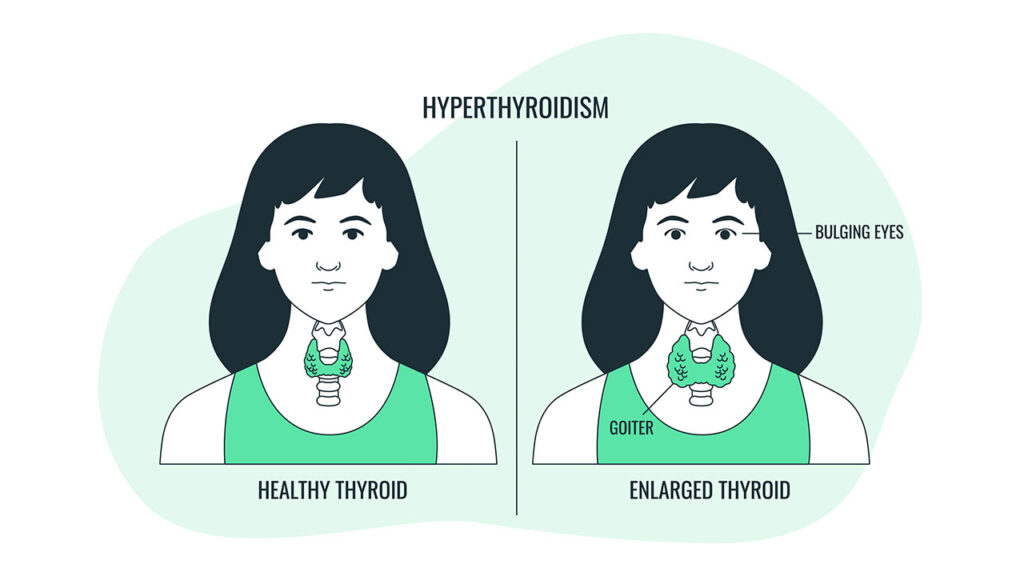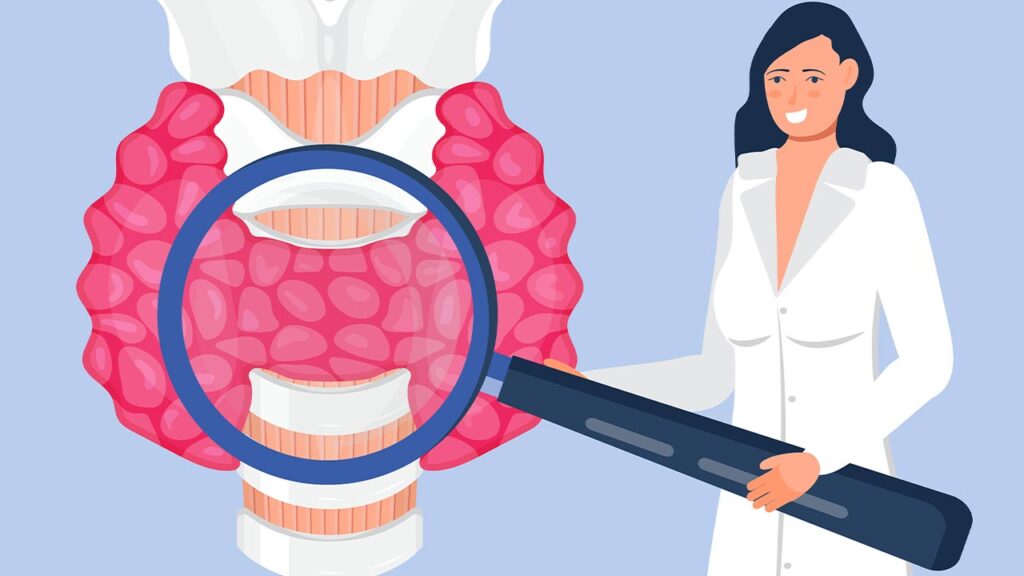Thyroid disease is a common condition that affects the thyroid gland, which is responsible for producing hormones that regulate the body’s metabolism. While it is a well-known fact that thyroid disease can have far-reaching effects on various aspects of an individual’s health, many people are unaware of the connection between dental health and thyroid disease. Dental health can be affected by the changes in hormone levels, metabolism, and other physiological processes that occur in individuals with thyroid disease.
The purpose of this blog is to educate individuals on the connection between dental health and thyroid disease. This blog will provide an overview of thyroid disease, its effects on dental health, and strategies for managing oral symptoms associated with the condition. Additionally, a FAQ section will be included to address common questions and concerns.
Understanding Thyroid Disease
A. Definition and Description of Thyroid Disease
Thyroid disease is a condition that affects the thyroid gland, which is located in the neck and produces hormones that regulate the body’s metabolism. There are two main types of thyroid disease: hypothyroidism, which occurs when the thyroid gland produces too little hormone, and hyperthyroidism, which occurs when it produces too much hormone.
B. Causes and Risk Factors for Thyroid Disease

The exact cause of thyroid disease is often unknown, but it can be associated with genetic factors, radiation exposure, certain medications, autoimmune disorders, and other health conditions. Women, individuals over the age of 60, and those with a family history of thyroid disease are at a higher risk for developing the condition.
C. Symptoms of Thyroid Disease
The symptoms of thyroid disease can vary depending on whether the individual has hypothyroidism or hyperthyroidism. Common symptoms of hypothyroidism include fatigue, weight gain, depression, and cold intolerance, while common symptoms of hyperthyroidism include weight loss, nervousness, rapid heart rate, and excessive sweating.
The Connection between Dental Health and Thyroid Disease
A. Effects of Thyroid Disease on Dental Health
Thyroid disease can have a number of effects on an individual’s dental health, including changes in hormone levels, metabolism, and other physiological processes. For example, individuals with hypothyroidism may experience dry mouth, which can lead to an increased risk for tooth decay and gum disease. On the other hand, individuals with hyperthyroidism may experience changes in the structure and appearance of their teeth, as well as an increased risk for tooth loss.
B. Oral Symptoms of Thyroid Disease
Individuals with thyroid disease may experience a number of oral symptoms, including dry mouth, swelling of the tongue, changes in the structure and appearance of the teeth, and a higher risk for tooth decay and gum disease. Additionally, individuals with thyroid disease may experience changes in their sense of taste and smell, as well as difficulty swallowing.
C. Impact of Dental Health on Thyroid Disease
Dental health can also have an impact on thyroid disease, as oral infections and inflammation can lead to changes in hormone levels and an increased risk for autoimmune disorders. Additionally, individuals with dental health problems may experience difficulty eating and speaking, which can exacerbate the symptoms of thyroid disease.
Managing Dental Health with Thyroid Disease
A. Importance of Oral Hygiene and Regular Dental Check-Ups
It is important for individuals with thyroid disease to maintain good oral hygiene and to see their dentist regularly for check-ups and cleanings. This can help to prevent oral infections, reduce the risk for tooth decay and gum disease, and keep the mouth healthy.
B. Recommended Dental Treatments for Individuals with Thyroid Disease
For individuals with thyroid disease, it is recommended to have regular dental check-ups and cleanings, as well as to receive any necessary dental treatments, such as fillings, extractions, or root canals. Additionally, individuals with dry mouth may benefit from using a saliva substitute or drinking water frequently to keep their mouth moist.
C. Strategies for Managing Oral Symptoms of Thyroid Disease
In addition to maintaining good oral hygiene and receiving regular dental check-ups, there are several strategies that individuals with thyroid disease can use to manage their oral symptoms. These may include drinking water frequently, using a saliva substitute, avoiding tobacco and alcohol, and eating a balanced diet that is rich in calcium, phosphorus, and other nutrients that are important for oral health.
healthcareDental health is an important aspect of overall health and well-being. Take control of your dental health with our top-quality dental health care products. Say goodbye to painful and inconvenient dental issues and hello to a brighter, healthier smile.
These products are designed with the latest technology and are made from premium materials, ensuring that you get the best results. Whether you’re looking for a solution for sensitive teeth, gum health, or just want to keep your smile sparkling, our dental health care products have got you covered.
Tired of hiding your smile due to yellowing, stained, or sensitive teeth?
ProDentim is here to help. This advanced formula whitens and strengthens your teeth, while also reducing sensitivity and promoting oral health. Say goodbye to expensive and painful dental treatments, and start enjoying a bright, confident smile with ProDentim.
Click Here to Try ProDentim now and see the results for yourself!
Struggling with tooth sensitivity, gum problems or bad breath?
Dentitox Pro is the solution you need. This natural, effective formula helps to clean and strengthen your teeth and gums, giving you a brighter, healthier smile. Dentitox Pro is made with the finest ingredients and is free from harmful chemicals, making it safe and gentle for everyday use. Say goodbye to pain and embarrassment, and start enjoying a confident, beautiful smile with Dentitox Pro.
Click Here to Order now and get 20% off your first purchase!
Click Here for Professional Teeth Whitening
Frequently Asked Question (FAQ)
A. What is Thyroid Disease?
Thyroid disease is a condition that affects the thyroid gland, which is located in the neck and produces hormones that regulate the body’s metabolism. There are two main types of thyroid disease: hypothyroidism and hyperthyroidism.
B. How Does Thyroid Disease Affect Dental Health?
Thyroid disease can have a number of effects on dental health, including changes in hormone levels, metabolism, and other physiological processes. This can result in oral symptoms such as dry mouth, changes in the structure and appearance of the teeth, and an increased risk for tooth decay and gum disease.
C. What are the Oral Symptoms of Thyroid Disease?
The oral symptoms of thyroid disease may include dry mouth, swelling of the tongue, changes in the structure and appearance of the teeth, and a higher risk for tooth decay and gum disease. Additionally, individuals with thyroid disease may experience changes in their sense of taste and smell, as well as difficulty swallowing.
D. How Can I Manage My Dental Health if I Have Thyroid Disease?
To manage dental health with thyroid disease, individuals should maintain good oral hygiene and see their dentist regularly for check-ups and cleanings. Additionally, individuals may benefit from using a saliva substitute, drinking water frequently, avoiding tobacco and alcohol, and eating a balanced diet that is rich in calcium, phosphorus, and other nutrients that are important for oral health.
E. Is it Important to Have Regular Dental Check-Ups if I Have Thyroid Disease?
Yes, it is important to have regular dental check-ups if you have thyroid disease. This can help to prevent oral infections, reduce the risk for tooth decay and gum disease, and keep the mouth healthy.
In this blog, we discussed the connection between dental health and thyroid disease, including the effects of thyroid disease on dental health, the oral symptoms of thyroid disease, and strategies for managing dental health with the condition.
It is important for individuals with thyroid disease to be aware of the connection between dental health and thyroid disease and to take steps to maintain good oral hygiene and receive regular dental check-ups. By doing so, individuals with thyroid disease can help to prevent oral infections, reduce the risk for tooth decay and gum disease, and keep their mouth healthy.
By considering the connection between dental health and thyroid disease, individuals can take a comprehensive approach to managing their health and well-being. This can help to improve overall health outcomes and prevent the development of additional health problems.
